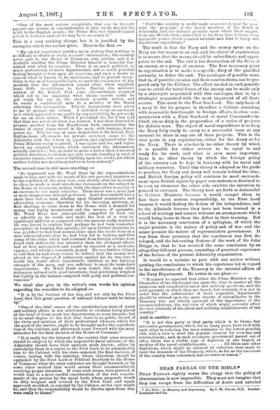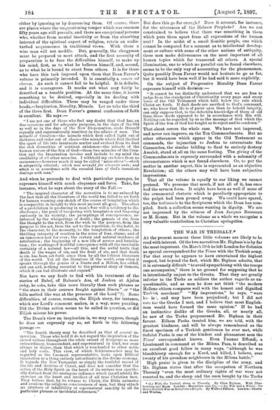DEAN FARRAR ON THE BIBLE.*
DEAN FARRAR rightly warns the clergy that the policy of obscurantism is now impossible. They must not imagine that they can escape from the difficulties of doubt and unbelief
• The its Meaning and Supremacy. By F. W. Farrar. D.D. Landon: Lowman. and Co.
either by ignoring or by denouncing them. Of course, there are places where the unquestioning temper which was common fifty years ago still prevails, and there are exceptional persons who, whether from mental inactivity or from the absorbing interest of the spiritual aspect of religion, retain an undis- turbed acquiescence in traditional views. With these a wise man will not meddle. But, generally, the clergyman must be prepared to meet attack, and the first necessity of preparation is to face the difficulties himself, to make up his mind, first, as to what he believes himself, and, second, as to what he is bound to exact from others. It is for those who have this task imposed upon them that Dean Farrar's volume is primarily intended. It is essentially a concio ad clerum. As such it cannot fail to be helpful. It is definite, and it is courageous. It marks out what may fairly be -described as a tenable position. At the same time, it leaves something to be desired, especially in its dealing with individual difficulties. These may be ranged under three heads,—Inspiration, Morality, Miracle. Let us take the third of the three first. Dean Farrar's general confession of faith is excellent. He says :—
" I am not one of those who feel any doubt that God has, on due occasions and for adequate purposes, in the days of the Old as well as in the days of the New Dispensation, made Himself signally and supernaturally manifest in the affairs of men. The miracle of Creation—the miracle which first called light out of darkness and order out of chaos—the miracle which first thrilled the spark of life into inanimate matter and evolved from its dust the rich diversities of sentient existence—the miracle of the human nature of the Son of God—those two miracles of the Crea- tion and the Incarnation involve and include to my mind the credibility of all other miracles. I withhold my credence from no occurrence—however much it may be called 'miraculous '—which is adequately attested; which was wrought for adequate ends ; and which is in accordance with the revealed laws of God's immediate dealings with man."
And when he proceeds to deal with particular passages, he expresses himself with much eloquence and force. Take, for instance, what he says about the story of the Fall :—
" The inspired character of the narrative is to me evinced by the fact that all the literature of the world has failed to set forth for human warning any sketch of the course of temptation which is comparable in insight to this most ancient all( gory. The effect of a prohibition in producing in man's free will a tendency to dis- obedience; the peril of tampering with temptation and lingering curiously in its vicinity ; the promptings of concupiscence, re- inforced by the whisperings of doubt ; the genesis of sin, from the thought to the wish, from the wish to the purpose, from the purpose to the act, from the act to the repetition, to the habit, to the character, to the necessity, to the temptation of others ; the thrilling intensity of reaction in the sense of fear, shame, and of an innocence lost for ever; the certain and natural incidence of retribution ; the beginning of a new life of sorrow and humilia- tion; the workings of deathful consequence with all the inevitable certainty of a natural law—all this, and the awful truth that death is the wages of sin, and the fruit of sin, and that death is sin, has been set forth since then by all the loftiest literature of the world. Yet all the literature of the world, even when it speaks through the genius of a Dante and a Milton, has added, and can add, nothing essential to the primeval story of Genesis, which it can but illustrate and expand."
Nor have we any fault to find with his treatment of the stories of Babel, of Balsam's Ass, of Joshua at Ajalon (why, he asks, take this more literally than such phrases as "the stars in their courses fought against Sisera" or "the hills melted like wax at the presence of the Lord "?). Some difficulties, of course, remain, the Elijah story, for instance, which our Lord's comment makes, in a way, more puzzling. Did the Divine action seems to be called in question, or did Elijah misuse his power.
The Dean's view on inspiration is, we may suppose, though he does not expressly say so, set forth in the following passage :—
"The fourth theory may be described as that of general in- spiration. Those who hold it do not regard the inspiration of the sacred writers throughout the whole extent of Scripture as more extraordinary, transcendent, and supernatural in kind, nor even always in degree, than that which is vouchsafed to other noble and holy souls. This view, of which Schleiermacher may be regarded as the foremost representative, looks upon Biblical inspiration as a thing entirely subordinate in the divine economy. It regards the New Testament as simply the truthful record of the life and doctrine of Christ, and does not consider that the action of the Holy Spirit on the heart of its writers was specific- ally distinct from the analagous influence which (as all admit) He exercises on the heart and intellect of all true Christian men. They believe that, by its witness to Christ, the Bible animates and awakens the religious consciousness of men, but they attach no attribute of infallibility or supernatural sanctity to all its particular phrases or incidental references." But does this go far enough ? Does it account, for instance,
for the utterances of the Hebrew Prophets ? Are we not constrained to believe that there was something in them which puts them apart from all expressions of the human soul ? In the midst of a small Semitic people, one which cannot be compared for a moment as to intellectual develop- ment or culture with some of the other nations of antiquity, these men make deliverances on the most important of all human topics which far transcend all others. A special illumination, one to which no parallel can be found elsewhere, seems to be the only way of accounting for the phenomenon. Quite possibly Dean Farrar would not hesitate to go as far, but it would have been well if he had said it more explicitly.
On the subject of Progressive Morality Dean Farrar expresses himself with decision :—
" It cannot be too distinctly understood that we are free to judge from the standpoint of Christianity every page and every verse of the Old Testament which falls below the rule which Christ set forth. If dark deeds are ascribed to God's command, we, who know that He is of purer eyes than to behold iniquity, can only suppose that, to the defective knowledge of them of old time, those deeds appeared to be in accordance with His will. Nothing can be regarded by us as the message of God which the Spirit of the Son of God has taught us to reject and to condemn."
That about covers the whole case. We have not improved, and never can improve, on the Ten Commandments. But no other utterances which appear in the Old Testament as commands, the injunction to Joshua to exterminate the Canaanites, the similar bidding to Saul to entirely destroy Amalek, stand at all on the same footing. The giving of the Commandments is expressly surrounded with a solemnity of circumstances which is not found elsewhere. Or, to put the matter in another aspect, this is represented as an objective Revelation; all the others may well have been subjective impressions.
That all the volume is equally to our liking we cannot pretend. We presume that much, if not all of it, has once had the sermon form. It might have been as well if some of the ornamental rhetoric which is peculiarly appropriate to the pulpit had been pruned away. We could have spared, too, the testimonia to the Scriptures which the Dean has com- piled. Such a collection seems wanting in dignity. We are not impressed by the witness of Jean Jacques Rousseau or M. Renan. But in the volume as a whole we recognise a very valuable contribution to Christian apologetics.



































 Previous page
Previous page